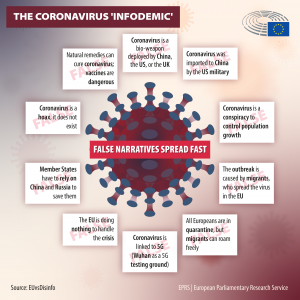The East StratCom Task Force is collecting, analysing and raising awareness about manipulated news and narratives related to the COVID-19 pandemic. Since January 2020, the team, working under the External Action Service, has collected over 150 examples in different languages (notably Russian, English, German, Arabic and Spanish), of pro-Kremlin disinformation about COVID 19. In addition, Parliament’s communication department is analysing the disinformation attempts and helping Parliament and EU authorities and other actors to warn citizens about the dangers of disinformation. Parliament is also promoting correct information about the EU’s role in the fight against the pandemic, as well as trusted sources of information on health aspects and the precautionary measures to be respected.
Set up by Parliament’s Science and Technology Options Panel, the European Science-Media Hub is collecting and publishing a regular coronavirus update providing a curated selection of the most relevant information provided by EU institutions and other European and global actors.
The Commission has launched a webpage dedicated to fighting disinformation about the coronavirus crisis, with key facts, and another providing online learning resources for teachers, educators and learners during the outbreak. Moreover, the Commission is cooperating closely with online platforms, encouraging them to promote authoritative sources, demote content that is verifiably false or misleading, and take down illegal content or content that could cause physical harm. The EU’s Rapid Alert System for monitoring serious disinformation campaigns, initially created ahead of the 2019 European elections, has also been utilised in recent weeks to counter disinformation efforts regarding the COVID-19 pandemic, enabling Member States to share knowledge on such disinformation efforts.








Be the first to write a comment.